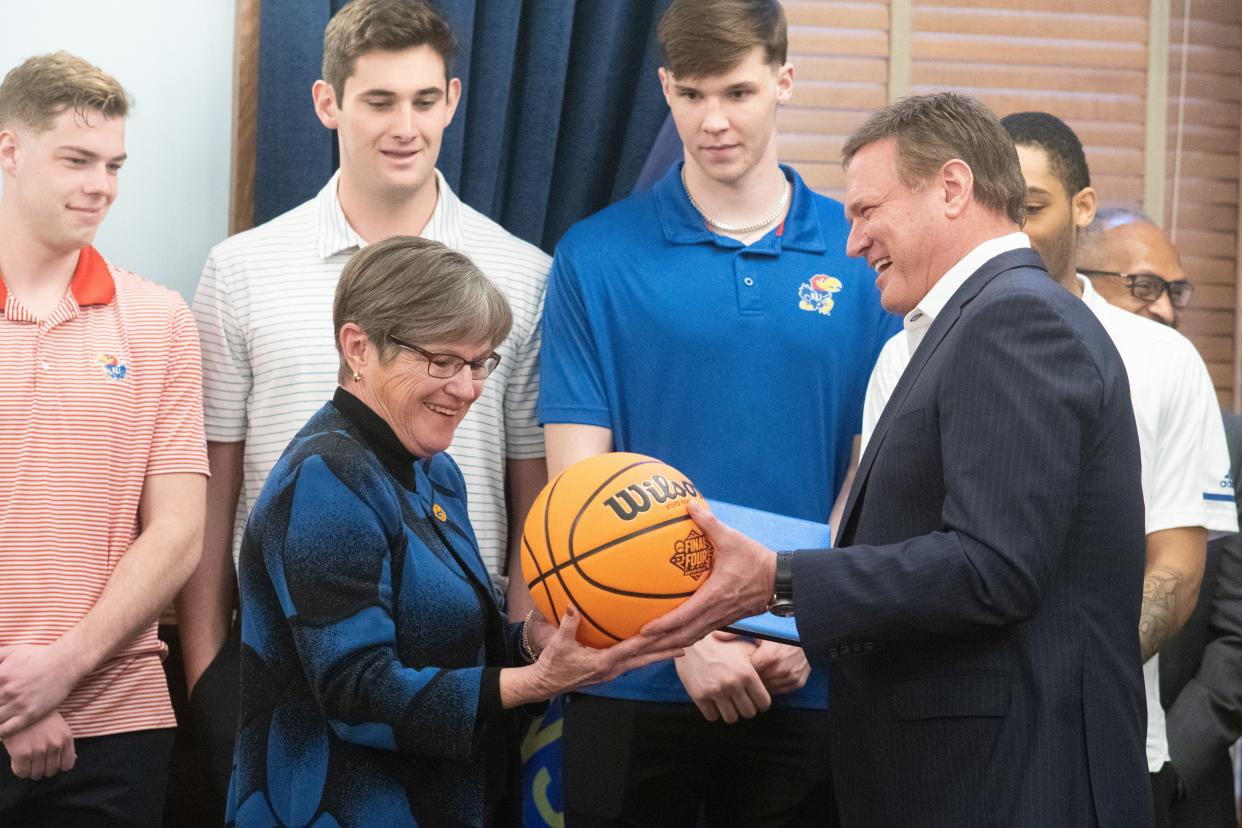Sports betting is now law in Kansas. Here's when you could start wagering on games.

A years-long wait for legalized sports betting in Kansas is over, after Gov. Laura Kelly signed legislation Thursday allowing for bettors to wager on their favorite team.
"Legalizing sports betting will bring more revenue to our state and grow our economy," Kelly said in a statement. "This is another mechanism that casinos, restaurants, and other entertainment venues can now utilize to attract Kansans to their establishments."
A framework for betting could be up and running in the state by the end of the year, though legal uncertainty about part of the bill's provisions could pose a speedbump. A Wichita area casino filed a lawsuit against the state the same day the bill was signed.
When could Kansans bet on Chiefs, Wildcats and Jayhawks?
While the system could possibly be set up in time for the NFL and college football seasons, it's more likely to be in place in January 2023. That would mean those hoping to bet on their favorite area football team, such as the Kansas City Chiefs or Kansas State Wildcats or Kansas Jayhawks, might have to wait for postseason games.
"I was excited to pass sports wagering in Kansas, it’s something that Kansans are already doing, and it will bring additional tax revenue to our state to help with our needs," said Sen. Rob Olson, R-Olathe, in a news release from the governor's office. "My constituents have pushed for this legislation for years, and now, the next time we have a significant sporting event in our state, Kansans will be able to bet on their hometown team."
Under the law, SB 84, the Kansas Lottery would have until Jan. 1, 2023, to create a regulatory environment for sports betting.
The exact length of time needed to prepare is unknown, including how long it would take for casinos to roll out their partnerships with sports betting applications. It is expected, however, that bettors would be able to begin wagering by spring of next year.
Under the bill, casinos can partner with online betting platforms, as well as up to 50 retailers, such as a restaurant or gas station, to offer in-person betting. The Kansas Speedway, Sporting Kansas City and the state's federally recognized tribes could also offer betting.
The state will take a flat 10% cut of all bets, regardless of whether they are placed online or in person.
A majority of revenue would be funneled to the "Attracting Professional Sports to Kansas Fund," an apparent attempt to capitalize on recent rumors that the Kansas City Chiefs would entertain moving their stadium across the border from Missouri.
"We have heard from our constituents for years about the need for a sports wagering program here in Kansas, both for the value it will bring to their lives and for the revenues it will generate for our state," said Sen. Oletha Faust-Goudeau, D-Wichita. "I’m proud to have contributed to this package that will do just that and revitalize my community by creating jobs in Wichita."
More: After years of waiting, Kansas lawmakers vote to legalize sports betting, attempt to lure KC Chiefs
Wichita Greyhound Park could spark lawsuit
One speed bump, however, is a lawsuit over a provision included in the bill that allows for historical horse racing at the Wichita Greyhound Park. That would not necessarily stop sports betting from occurring, though the exact impact is unclear.
The Kansas Star Casino in Mulvane, one county south of Wichita, was expected to argue historical horse racing violates the contract created when the state legalized casino betting in 2007.
Within hours of Kelly signing the sports betting law, the casino filed a lawsuit in Shawnee County District Court, the Associated Press reported. While casino operator Boyd Gaming is supportive of legalized sports betting, it is seeking a $25 million penalty for the alleged breach of contract.
There is debate over whether historical horse racing is tantamount to pari-mutuel betting, a different class of gaming that would be allowable under the Kansas Expanded Lottery Act.
Attorney General Derek Schmidt said in an interview last month that his office has been tracking the matter. Schmidt's office previously said a more expansive effort to allow for slots at the greyhound park would violate gaming contracts.
"We're mindful of that bill was passed," Schmidt said. "We're taking a look at it to see what role if any, we need to play and because I don't know what that might look like, I probably don't need to talk much more about it until we've assessed it."
Andrew Bahl is a senior statehouse reporter for the Topeka Capital-Journal. He can be reached at abahl@gannett.com or by phone at 443-979-6100.
This article originally appeared on Topeka Capital-Journal: Kansas sports betting is now law, with wagering to begin in 2023

